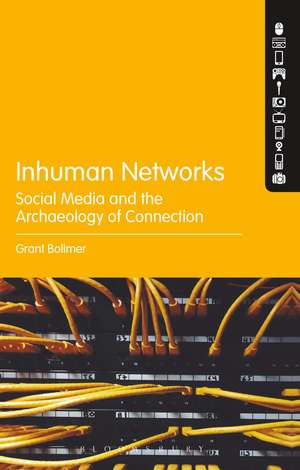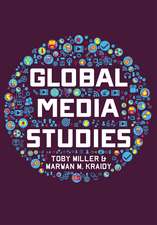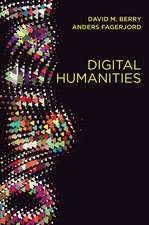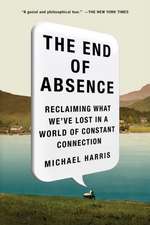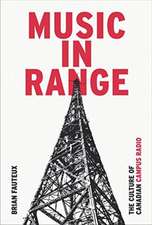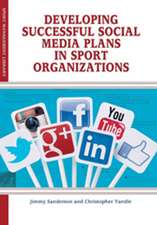Inhuman Networks: Social Media and the Archaeology of Connection
Autor Dr. Grant Bollmeren Limba Engleză Paperback – 21 feb 2018
| Toate formatele și edițiile | Preț | Express |
|---|---|---|
| Paperback (1) | 238.29 lei 6-8 săpt. | |
| Bloomsbury Publishing – 21 feb 2018 | 238.29 lei 6-8 săpt. | |
| Hardback (1) | 774.46 lei 6-8 săpt. | |
| Bloomsbury Publishing – 10 aug 2016 | 774.46 lei 6-8 săpt. |
Preț: 238.29 lei
Preț vechi: 306.03 lei
-22% Nou
Puncte Express: 357
Preț estimativ în valută:
45.60€ • 48.76$ • 38.02£
45.60€ • 48.76$ • 38.02£
Carte tipărită la comandă
Livrare economică 17 aprilie-01 mai
Preluare comenzi: 021 569.72.76
Specificații
ISBN-13: 9781501340178
ISBN-10: 1501340174
Pagini: 304
Ilustrații: 20 bw illus
Dimensiuni: 152 x 229 x 21 mm
Greutate: 0.39 kg
Ediția:NIPPOD
Editura: Bloomsbury Publishing
Colecția Bloomsbury Academic
Locul publicării:New York, United States
ISBN-10: 1501340174
Pagini: 304
Ilustrații: 20 bw illus
Dimensiuni: 152 x 229 x 21 mm
Greutate: 0.39 kg
Ediția:NIPPOD
Editura: Bloomsbury Publishing
Colecția Bloomsbury Academic
Locul publicării:New York, United States
Caracteristici
Contextualizes present technologies within a much larger history, identifying what is actually new about our new technologies - correcting the assumption that social media is without history
Notă biografică
Grant Bollmer is Assistant Professor of Media Studies at North Carolina State University, where he teaches in the Department of Communication and the PhD Program in Communication, Rhetoric, and Digital Media, and an Honorary Associate of the Department of Media and Communications at The University of Sydney.
Cuprins
1. Introduction: Connectivity, Flow, CitizenshipPart One: Network Archaeologies 2. Biology: Vital Technologies, Anatomical Networks3. Society: Railroads, Red Scares, and Racism4. Economy: Banking on ConnectionPart Two: Nodal Citizens5. Death: Living Forever as Automated Data6. Labor: Giving Life to (Mobile) Fixed Capital7. Truth: The Politics of Performing the Total SelfPart Three: Beyond Social Media, or, a World Without People8. Contagion: The Inevitable Failure of Connectivity9. (Political) Theory: How to Disempower Friends and Pathologize PeopleBibliographyIndex
Recenzii
Part an archaeology of connectivity, part critical analysis of contemporary culture, Inhuman Networks offers an inspiring take for media studies. Grant Bollmer's rich, multi-layered book shows that social media does not just mediate but performs a subtle yet effective moral code: the networks prescribe senses of the self, community, value and direction. The so-called human exists only if it routes.
Bollmer's Inhuman Networks represents the best of the cultural studies tradition of taking the object seriously, learning everything one can about it, putting it into historical and cultural contexts, and then rigorously critiquing it. Combining media archaeology and genealogy, Bollmer crafts critiques of the admonition to connect or be considered inhuman. However, he also challenges misguided calls for total refusal of connection, instead insisting we humans re-engage with practices of collectivity and commonality.
Bollmer's Inhuman Networks issues a bold and welcome critique of social media's culture of connectivity. This accessible, provocative analysis of the "network" concept is shaped by network theorists predating the network society: anatomists deciphering the flow of bodily fluids, railroad conglomerates arguing about rail gauge, defenders of branch banking, and conspiracy theorists. Bollmer deftly shows how the conjunction of these early modern discourses of the network combine with contemporary digital technologies to forge "nodal citizenship," a reduction of the human to an information node in a broader technological network. A must-read for anyone interested in communication, media studies, cultural theory, and political economy.
Inhuman Networks masterfully exposes the stunted understandings and logical fallacies undergirding widespread economic and cultural assertions that unless we are connected through social media we are less than human. Bollmer convincingly argues that enlightenment understandings of "human nature" are being supplanted by neoliberal and normative narratives of networked communications as the way to finally achieve full humanity. Yet this is a disempowered form of "humanity" constituted through capital and data alone and ultimately less important than the inhuman(e) routers through which individuals "connect" in empowered and irrelevant ways.
As social media becomes more pervasive in many people's lives globally, the complex entanglement of the human and inhuman across practices, cultures, flows and networks are yet to being fully understood. Grant Bollmer's Inhuman Networks: Social Media and the Archaeology of Connection offers a thorough and thought-provoking discussion of how we might re-imagine social media beyond a human-centric model bolstered by problematic metaphors around connection. From metaphors such as "networks" to "contagion", Bollmer takes us on a fascinating journey in and around the messy relationality between technology, desire and humans. This book puts the complex human and beyond-human dimensions of social media in context historically and conceptually in ways that are both poetic and inspiring.
Bollmer's Inhuman Networks represents the best of the cultural studies tradition of taking the object seriously, learning everything one can about it, putting it into historical and cultural contexts, and then rigorously critiquing it. Combining media archaeology and genealogy, Bollmer crafts critiques of the admonition to connect or be considered inhuman. However, he also challenges misguided calls for total refusal of connection, instead insisting we humans re-engage with practices of collectivity and commonality.
Bollmer's Inhuman Networks issues a bold and welcome critique of social media's culture of connectivity. This accessible, provocative analysis of the "network" concept is shaped by network theorists predating the network society: anatomists deciphering the flow of bodily fluids, railroad conglomerates arguing about rail gauge, defenders of branch banking, and conspiracy theorists. Bollmer deftly shows how the conjunction of these early modern discourses of the network combine with contemporary digital technologies to forge "nodal citizenship," a reduction of the human to an information node in a broader technological network. A must-read for anyone interested in communication, media studies, cultural theory, and political economy.
Inhuman Networks masterfully exposes the stunted understandings and logical fallacies undergirding widespread economic and cultural assertions that unless we are connected through social media we are less than human. Bollmer convincingly argues that enlightenment understandings of "human nature" are being supplanted by neoliberal and normative narratives of networked communications as the way to finally achieve full humanity. Yet this is a disempowered form of "humanity" constituted through capital and data alone and ultimately less important than the inhuman(e) routers through which individuals "connect" in empowered and irrelevant ways.
As social media becomes more pervasive in many people's lives globally, the complex entanglement of the human and inhuman across practices, cultures, flows and networks are yet to being fully understood. Grant Bollmer's Inhuman Networks: Social Media and the Archaeology of Connection offers a thorough and thought-provoking discussion of how we might re-imagine social media beyond a human-centric model bolstered by problematic metaphors around connection. From metaphors such as "networks" to "contagion", Bollmer takes us on a fascinating journey in and around the messy relationality between technology, desire and humans. This book puts the complex human and beyond-human dimensions of social media in context historically and conceptually in ways that are both poetic and inspiring.
